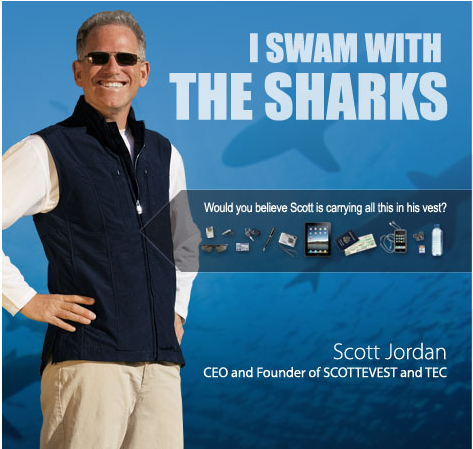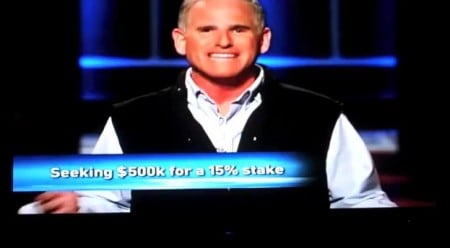
If the name Scott Jordan sounds familiar, it’s probably because you’ve seen it in the context of his clothing line, Scottevest. We’ve reviewed many of their products here, and I will say I personally use my SeV gear quite often. However, after seeing Scott on ABC’s “Shark Tank” and witnessing his attitude on the show, I can’t help but wonder how he runs his business!
In case you missed it last night, here’s a shot from Scott’s segment. (The episode is available on Hulu+)
To make a long story short, Scott doesn’t want to sell SEV; he just wants to sell the licensing to his TEC (Tech Enabled Clothing) patent. Basically, he wants to keep his profits on the SEV line and leverage the Sharks for his patents. But if he’s projected to do $24 million from the SEV line, why would he even consider giving up control of the patents? Nothing about this makes sense — including the fact that, based on what I know about the history of Apple and the partnership between Woz and Jobs, I wouldn’t ask Steve Wozniak for business advice.
All joking aside, let’s look at this for a second. He has an incredibly lucrative internet business, but last time I checked he sells ZILCH (or close to it) in stores and that’s, where many clothing companies make the serious money. Assuming Scott really did just want to sell his patent licensing, he must know that. So let’s look at the companies who would be his “customers” for these patents.
UnderArmor did $1.6 billion in revenue in 2011.
Nike did $20.89 billion, and apparel alone were roughly $5.4 billion in mid-2011
VF Corp (owners of Timberland, North Face, Levis, etc) had $9.46 billion in 2011
Columbia Sportswear had $1.6 billion dollars in sales in 2011
Meanwhile, Scottevest — a company whose sales are fueled by word of mouth, tech, and travel blog reviews, online and print advertising, and a sales website — apparently has $5.1 million in sales for 2011 (I am assuming this filmed last year), with $12 million projected. That’s impressive for a small business, but it is TINY compared to his competition.
There’s room for growth here; I think Scott knows this, and he simply didn’t want to include the sharks in the cut. However, getting the big guy, — the companies listed above — to license TEC requires money and connections, which is ostensibly why Scott appeared on Shark Tank. But how much could TEC possibly be worth, if an entire line of TEC-enabled products only generated $12 million? Even Columbia and UA, who are pretty niche as far as apparel companies, are doing 100x what SeV does in revenue!
Theoretically, these companies jumping on the TEC bandwagon could be extremely valuable … but that’s assuming that Nike, VF Corp, Columbia, UnderArmor, etc., all would agree to pay Scott his royalty / licensing fee rather than looking up his patent and working around it. That also assumes as Mark Cuban and Daymond John pointed out, that the garments produced continue to use wires.
Were a company to eliminate the wiring system or alter it, they wouldn’t technically even need TEC. Basically, the sharks were being asked to throw $500,000 down on something that might or might not actually have a revenue stream. Scott mentioned Gore-tex on Shark Tank, but Gore-tex doesn’t sell their own line along with licensing it to other clothing companies. Is Nike so excited about TEC that they’d be willing to license something a competitor was also offering? Or would they be better off using their own connections, money, designers and other resources to come up with something similar that they don’t need to pay an ongoing royalty for?
At one point the Sharks flat-out asked Scott why he was there, and he declared he wanted their connections and money, but only to license his patents, not sell his clothing. The Sharks’ reactions appeared to run the gamut from incredulous curiosity to thinly veiled animosity.
From last night’s airing of the show until now, those who tuned in have been theorizing about why Scott would bother to appear on the show if he wasn’t willing to give up a share of his proven moneymaker. These are some of the reasons I believe he did SharkTank:
1) Publicity for Scottevest. He knew the sharks were unlikely to take the patent deal, but they talked up SeV like it was the best invention since the iPod. Free 20 minute prime-time network television ad for SeV!
2) Throw it against the wall and see what sticks. Maybe Scott thought he’d get a serious chunk of change for SeV out of it, though apparently an amount equaling 10% of his sales so far that year wasn’t a serious enough chunk for Scott.
3) He really genuinely wanted to license TEC.
I really think he went on the show offering a completely insane pitch because he knew they’d talk up his “real” business, and he got the attention and generated more buzz for SEV. He made a poor business decision because I think those guys would have offered him some serious cash for the clothing business, but he clearly didn’t want to give up his control of SeV. He was foolish to go on the show with this agenda because this has not and will not reflect well on his image. He’s been whining about the edit on Facebook and has taken to commenting everywhere that it went down differently than was shown, that he is getting the short end, etc.
Newsflash: reality television is always edited, and it is seldom done in a flattering way if you aren’t the main star of the show.
They have to make it look exciting and dramatic. But here’s the other thing; you need to give them something to work with! Editors can cut comments and try to make things look snippier or more dramatic, but if you said something that could be construed as “good tv” that’s on you, not the editors. I’ll fully admit that someone could cut and paste my words to read as “I really think he went on the show offering a completely insane pitch because he’s a fool.” It changes some of the context of my sentence but at the end of the day, I can’t deny that I did say Scott was being foolish, and editing just makes that look more pointed. So, Scott, you chose to go on Shark Tank, no one went around kidnapping entrepreneurs and forcing them to make elevator speeches, you signed up for it … don’t complain that you don’t like how they showed you!
The other reason I think this is foolish is that Scott went on Shark Tank and pitched to Daymond John, the founder of FUBU, and Mark Cuban, who knows technology extremely well. These guys now know Scott’s revenue, they probably have a profile on the SeV business above and beyond what we saw on the show, and they know his patent portfolio. They flat out told him how they’d compete with SeV!
I hope for Scott’s sake that there’s a strong anti-compete clause for anyone pitching to the sharks because otherwise Scott just went on television and explained to a competing clothing company why his company is successful and how to get around their patents!
So while it may be true that Scott got some free publicity and a chance to brag on SeV on national television, the sharks sat around and basically laid out the weaknesses in his business model, but didn’t get to invest in what they felt was the more lucrative business. So who was the real shark here? The venture capitalists on the Shark panel or Scott, who basically got a free 20-minute prime-time ad for SeV?
Or maybe it’s the rival clothing companies, who can now sit down and come up with ways to compete?
Let us know in the comments!
Opinions expressed in this post are mine alone and do not necessarily reflect the views of all Gear Diary writers.
